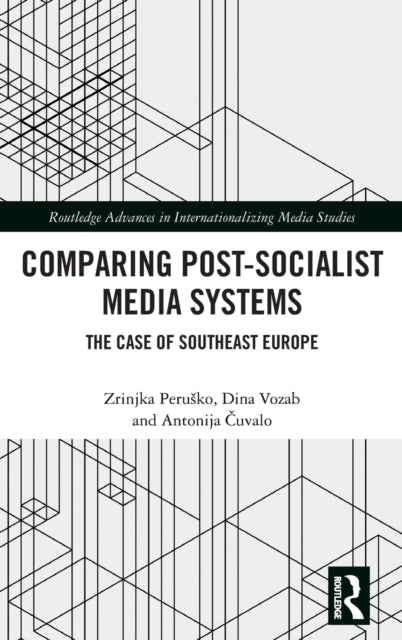Zrinjka Perusko,Dina Vozab,Antonija Cuvalo
Comparing Post-Socialist Media Systems: The Case of Southeast Europe
Comparing Post-Socialist Media Systems: The Case of Southeast Europe
YOU SAVE £6.96
- Condition: Brand new
- UK Delivery times: Usually arrives within 2 - 3 working days
- UK Shipping: Fee starts at £2.39. Subject to product weight & dimension
Bulk ordering. Want 15 or more copies? Get a personalised quote and bigger discounts. Learn more about bulk orders.
Couldn't load pickup availability
- More about Comparing Post-Socialist Media Systems: The Case of Southeast Europe
This book explores divergent media system trajectories in southeast Europe, challenging the assumption that the common socialist experience significantly influences media development after democratic transformations. It offers a novel theoretical framework for comparative analysis of post-socialist media systems, building on historical institutionalism and critical junctures. It expands the understanding of media systems beyond political journalism and is a valuable contribution to the literature on comparative media systems.
\n Format: Hardback
\n Length: 302 pages
\n Publication date: 05 October 2020
\n Publisher: Taylor & Francis Ltd
\n
This comprehensive book delves into the intricate dynamics of divergent media system trajectories across Southeast Europe, challenging the prevailing assumption that the shared socialist experience holds significant sway over the outcome of media development following democratic transformations. Through a novel longitudinal set-theoretical methodological approach, the author makes a groundbreaking contribution to the field of media systems theory, offering a fresh theoretical framework for the comparative analysis of post-socialist media systems. This theoretical framework builds upon the foundations of historical institutionalism and incorporates the concept of critical junctures and path dependency to unravel the similarities and differences observed in the media systems of the Eastern European region.
By expanding the scope of media systems beyond a mere focus on political journalism, this book emerges as a valuable addition to the literature on comparative media systems. It appeals to scholars and researchers in the domains of media systems studies, political science, Southeast and Central European studies, post-socialist studies, and communication studies.
The book begins by examining the historical legacies and political contexts that shape media systems in the region. It explores the complex interplay between state institutions, economic structures, and social movements, highlighting the factors that contribute to the divergent paths taken by different countries. The author then delves into the specific mechanisms and processes that drive media system development, including the role of media regulation, ownership patterns, and the influence of political elites.
Through a series of case studies, the book provides in-depth insights into the contemporary media landscapes of countries such as Bulgaria, Croatia, Hungary, Romania, and Serbia. It examines the challenges and opportunities faced by these countries as they navigate the transition from socialism to democracy, exploring the role of media in shaping public opinion, promoting social cohesion, and fostering democratic governance.
The book challenges the notion that post-socialist media systems can be easily categorized or compared based on a singular model. Instead, it emphasizes the diversity and complexity of the region, highlighting the unique historical, cultural, and political factors that shape each media system. It argues that media systems are not merely passive recipients of external influences but are active agents that shape and influence societal developments.
The theoretical framework developed in the book is grounded in a robust set of empirical evidence and analytical tools. The author employs a comparative analysis approach, drawing on a wide range of secondary sources, interviews, and empirical research to examine the dynamics of media systems across time and space. This approach allows for a nuanced understanding of the complex relationships between media systems, political institutions, and social movements.
In conclusion, this book is a groundbreaking contribution to the field of media systems studies. It offers a fresh perspective on the dynamics of media system development in Southeast Europe, challenging the conventional wisdom and providing valuable insights into the complex interplay between historical legacies, political contexts, and media systems. By expanding the understanding of media systems beyond a narrow political journalism focus, the book makes a significant contribution to the literature on comparative media systems, appealing to scholars and researchers across a wide range of disciplines.
\n Weight: 634g\n
Dimension: 162 x 240 x 24 (mm)\n
ISBN-13: 9780367226770\n \n
This item can be found in:
UK and International shipping information
UK and International shipping information
UK Delivery and returns information:
- Delivery within 2 - 3 days when ordering in the UK.
- Shipping fee for UK customers from £2.39. Fully tracked shipping service available.
- Returns policy: Return within 30 days of receipt for full refund.
International deliveries:
Shulph Ink now ships to Australia, Belgium, Canada, France, Germany, Ireland, Italy, India, Luxembourg Saudi Arabia, Singapore, Spain, Netherlands, New Zealand, United Arab Emirates, United States of America.
- Delivery times: within 5 - 10 days for international orders.
- Shipping fee: charges vary for overseas orders. Only tracked services are available for most international orders. Some countries have untracked shipping options.
- Customs charges: If ordering to addresses outside the United Kingdom, you may or may not incur additional customs and duties fees during local delivery.


